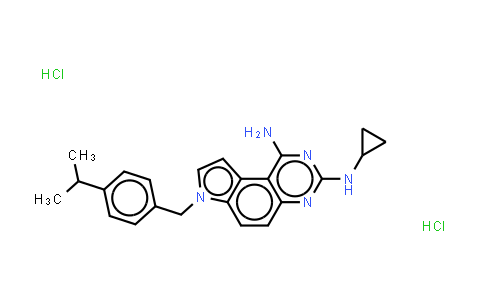| Chemical Name |
SCH79797 (dihydrochloride) |
| CAS Number |
1216720-69-2 |
| MDL Number |
MFCD04039788 |
| Molecular Formula |
C23H27Cl2N5 |
| Molecular Weight |
444.40 |
Introduction of 1216720-69-2 :
SCH79797 dihydrochloride is a highly potent, selective nonpeptide protease activated receptor 1 (PAR1) antagonist. SCH79797 dihydrochloride inhibits binding of a high-affinity thrombin receptor-activating peptide to PAR1 with an IC50 of 70 nM and a Ki of 35 nM. SCH79797 dihydrochloride inhibits thrombin-induced platelet aggregation with an IC50 of 3 μM. SCH79797 dihydrochloride has antiproliferative and pro-apoptotic effects, and limits myocardial ischemia/reperfusion injury in rat hearts. SCH79797 dihydrochloride also potently prevents PAR1 activation in vascular smooth muscle cells, endothelial cells, and astrocytes[1][2][3][4]. IC50 & Target: Protease activated receptor 1 (PAR1)[1]; Apoptosis[3] In Vitro: SCH79797 inhibits high-affinity thrombin receptor-activating peptide ([3H]haTRAP) binding in a competitive manner. SCH79797 inhibits α-thrombin- and haTRAP-induced aggregation of human platelets, but does not inhibit human platelet aggregation induced by the tethered ligand agonist for protease-activated receptor-4 (PAR-4), γ-thrombin, ADP, or collagen. Thrombin produces transient increases in cytosolic free Ca2+ concentration ([Ca2+]i) in hCASMC. SCH79797 effectively inhibits this increase in [Ca2+]i. SCH79797 completely inhibits Thrombin- and TK-stimulated [3H]thymidine incorporation [1].
SCH79797 is able to interfere with the growth of several human and mouse cell lines, in a concentration-dependent manner. The ED50 for growth inhibition iss 75 nM, 81 nM and 116 nM for NIH 3T3, HEK 293 and A375 cells, respectively. In NIH 3T3 cells, SCH79797 inhibits serum-stimulated activation of p44/p42 mitogen-activated protein kinases (MAPK) at low concentrations and induces apoptosis at higher concentrations[2]. In Vivo: SCH79797 (2.5-250 μg/kg; intravenous injection; male Sprague Dawley rats) treatment immediately before or during ischemia reduces myocardial necrosis following I/R in the intact rat heart in two rat models of myocardial ischemia/reperfusion (I/R) injury. This response is dose-dependent with the optimal dose being 25 μg/kg[4].
| Purity |
NLT 98% |
| Storage |
at 20ºC 2 years |
*The above information is for reference only.
